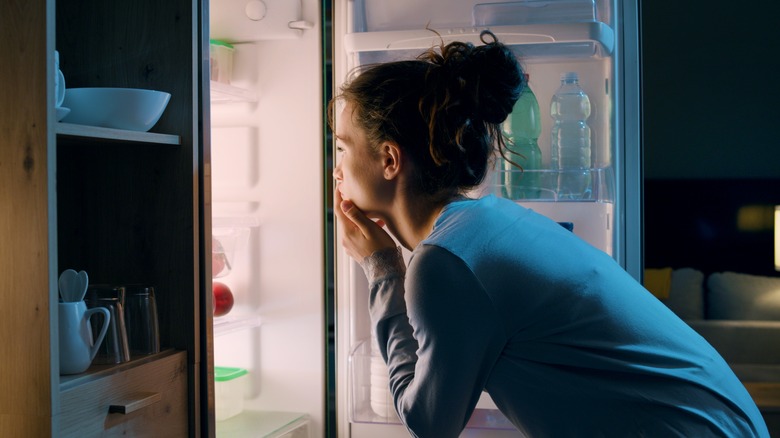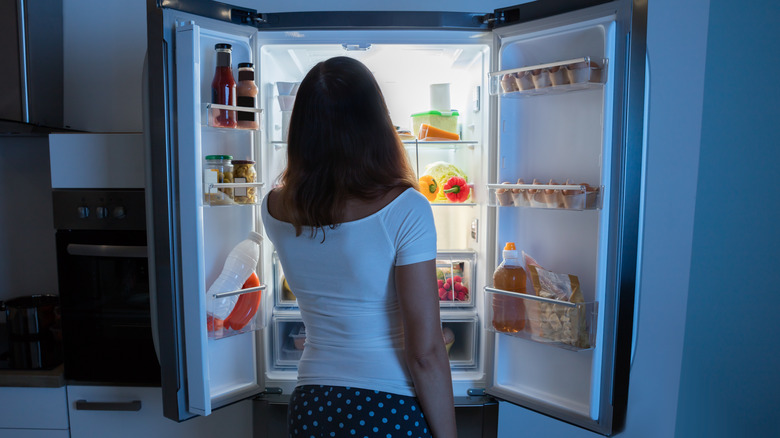Can Eating Late At Night Make You Hungrier?
The ability to create and enjoy a myriad of delicious meals is one of the greatest perks of being human. Many of us eat whenever our stomachs rumble or we experience other physical cues that indicate hunger, but did you know that it may be better for us to plan our meals instead?
A consistent mealtime routine is beneficial for the body, as it could help to lose weight and increase energy levels, according to Healthline. As food is digested differently at varying times of the day, our body's circadian rhythm can be affected by the times of the day when we choose to eat.
You may have heard the phrase, "Breakfast is the most important meal of the day." As explained by Northwestern Medicine, you should eat breakfast within an hour after waking up in the morning to replenish your body after a night of not eating. To keep yourself energized until lunchtime, choose breakfast foods that contain protein.
The best time to eat lunch is four to five hours after you have breakfast. It's important to make time for these two meals in order to prevent overeating at dinner. It's been suggested that eating dinner earlier in the night may have better health outcomes, notes Healthline.
Some research has also discovered a link between late-night eating and weight gain. Inquiring minds may wonder if late-night meals increase appetite as well, and if so, how can someone go about fending off their midnight munchies?
Do you get more hungry when you eat late at night?
A grumbling stomach can make sleeping nearly impossible. When you're so hungry, you may run to the refrigerator for a midnight snack without considering the potential consequences.
In a 2022 article published in Cell Metabolism, 16 participants were observed in a laboratory setting (per The Washington Post). It was discovered that compared to eating breakfast at 8 a.m. and dinner at 4 p.m., eating breakfast at 12 p.m. and dinner at 8 p.m. increased participants' hunger and decreased their energy expenditure upon waking. The participants stored more fat due to eating later, which was found to decrease their ability to burn calories.
According to CNN, there was also a greater craving for starchy and salty foods among participants who ate later. The researchers hypothesized that the physiological changes occuring within late eaters may increase their risk of obesity.
The results of the blood tests in the study suggested that late eating had a significant impact on hormone levels, which could lead to increased appetite. Specifically, increased levels of ghrelin and decreased levels of leptin were associated with eating later. Hunger signals are relayed to the brain by the hormone ghrelin (per Cleveland Clinic). As soon as enough energy from food is stored in the body, the hormone leptin sends signals to the brain to communicate that it's time to stop eating.
The study did have limitations; for example, CNN notes that a later breakfast could have played a role in the results.
How to prevent eating late at night
Now that you know that it may be better to eat sooner rather than later, you may have a newfound desire to become more mindful of your eating habits. You might also be wondering how you can fend off your cravings for a late-night snack.
This goal can be met by consuming most of your calories earlier in the day, and by planning structured meals and snacks throughout the day (per Insider). Sleeping seven to eight hours per night is also important, since sleep deprivation impacts hormones that regulate appetite.
According to The Wellnest, you could also try removing unhealthy snacks from your home and replacing them with healthy alternatives for when your cravings are irresistible. Additionally, drinking water can make our stomachs feel more full, so you may find that you can satisfy your hunger pangs by drinking water or herbal tea.
To become better in tune with your body's hunger signals, you can also try to recognize when you aren't actually hungry, but you are craving food because you are bored or stressed. If you are hungry due to emotional reasons, you can distract yourself with another bedtime routine, such as taking a bath, reading a book, or listening to a podcast (per MyNetDiary).



